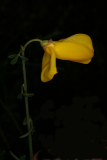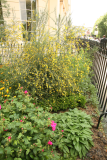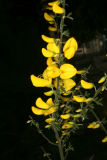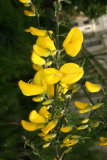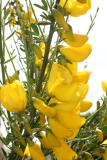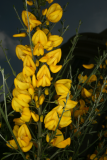Additional notes (click to expand)
Commemorative
Previously known as 'Genista' it was adopted by King Henry II of England as a heraldic device. The name 'planta genista' became the name of his dynasty - the Plantagenets. Montague-Drake has to be read with caution as he says that 'butcher's broom' was Cytisus scoparius, whereas it is normally regarded as being Ruscus aculeatus.
Montague-Drake, Blair. (1977). A Biblical Herbal. Earth Images, Australia. p.39
Horticulture
Prune annually after flowering to conserve vigour and compact form. Flowers on previous year's wood. Remove two thirds of previous year's shoots which results in the removal of most of the developing seed pods. Do not cut into old hard wood as does not break freely. Prevents shrubs becoming leggy.
Brown, George E. (2004). The Pruning of Trees, Shrubs and Conifers, 2nd ed.. Timber Press. p.179
Medicinal
Culpeper (1649) “... purge waters and are good in dropsies.”
Notes: Dropsy basically means swollen ankles from fluid retention, for which there may be several causes. The expression ‘purge waters’ may mean that is was thought to increase urine output.
Culpeper, Nicholas. (1650). A Physical Directory . London, Peter Cole.
Culpeper (1650) writes: 'Genista. Broom: … clense and open the stomach, break the stone in the reins [kidneys] and bladder, help the green sickness [anaemia]. Let such as are troubled with heart qualms or faintings, forbear it, for it weakens the heart and spirit vital' and in respect of the flowers he writes: 'Broome-flowers, purge water, and are good in dropsies [now regarded as heart failure with fluid retention].'
Oakeley, Dr. Henry F. (2013). Wellcome Library notes.
link
Phytochemistry
It contains the alkaloid sparteine.
Medicines and Health Care Regulatory Agency , MCA. (2002). Medicines and Health Care Regulatory Agency (MHRA) for restricted or prohibited herbal medicines. Medicines and Health Care Regulatory Agency .
link
Toxicity
It contains the alkaloid sparteine which is a cardiac depressant (MCA, 2002) so should not be used in heart failure.
Medicines and Health Care Regulatory Agency , MCA. (2002). Medicines and Health Care Regulatory Agency (MHRA) for restricted or prohibited herbal medicines. Medicines and Health Care Regulatory Agency .
link
Geographical distribution
- Africa, Macaronesia, Canary Is.
- Africa, Macaronesia, Madeira
- Europe, Eastern Europe, Baltic States
- Europe, Eastern Europe, Belarus
- Europe, Eastern Europe, Ukraine
- Europe, Middle Europe, Austria
- Europe, Middle Europe, Belgium
- Europe, Middle Europe, Germany
- Europe, Middle Europe, Hungary
- Europe, Middle Europe, Netherlands
- Europe, Middle Europe, Poland
- Europe, Middle Europe, Switzerland
- Europe, Northern Europe, Denmark
- Europe, Northern Europe, Great Britain
- Europe, Northern Europe, Ireland
- Europe, Northern Europe, Norway
- Europe, Northern Europe, Sweden
- Europe, Southeastern Europe, Czech Republic
- Europe, Southeastern Europe, Italy
- Europe, Southeastern Europe, Romania
- Europe, Southeastern Europe, Yugoslavia
- Europe, Southwestern Europe, France
- Europe, Southwestern Europe, Portugal
- Europe, Southwestern Europe, Spain
Cytisus scoparius (L.) Link
Family: FABACEAEGenus: Cytisus
Species: scoparius (L.) Link
Common names: Broom
Pharmacopoeia Londinensis name: Genistae
Distribution summary: Europe
Habit: Shrub
Hardiness: H5 - Hardy; cold winter
Garden status: Currently grown
Garden location: Pharmacopoeia Londinensis 1618 'Flowers' (HSE 1), Pharmacopoeia Londinensis 1618 'Flowers' (HSE 1B)
Flowering months: February
Reason for growing: Medicinal
